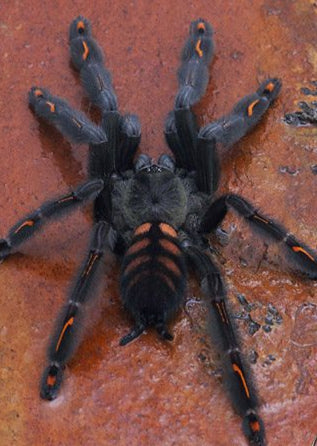Description
Psalmopoeus irminia- Venezuelan Suntiger
Housing
- Enclosure: For slings, use a tall, secure container (plastic vial, deli cup, or small acrylic terrarium) with good cross-ventilation. As the tarantula matures, upgrade to a taller enclosure (minimum 30 cm / 12″ height for adults) to allow for climbing and webbing.
- Substrate: Provide 2–3 inches of moisture-retaining substrate (coconut fiber, peat moss, or a mix) at the bottom. Even though they are arboreal, they sometimes rest near the base or dig slightly.
- Decor & Hides: Add vertical cork bark, branches, or bamboo for climbing, along with some silk plants or foliage for cover—P. irminia will create heavy webbing around these structures.
- Humidity: Maintain 70–80%. Lightly mist one side of the enclosure every few days to keep part of the substrate slightly damp without waterlogging. Ensure ventilation to prevent mold.
- Temperature: 24–27 °C (75–81 °F) is ideal, but they tolerate 22–28 °C (72–82 °F). Usually room temperature is fine in most homes.
Feeding
-
Diet: Offer appropriately sized prey:
- Slings: Pinhead crickets, flightless fruit flies, or very small roaches 2–3 times per week.
- Juveniles & adults: Crickets, dubia roaches, or similar insects 1–2 times per week. Prey should be no larger than the tarantula’s abdomen.
- Water: Place a tiny water dish in juvenile/adult enclosures. For slings, mist the enclosure lightly so they can drink from droplets—avoid soaking the substrate.
General Care
- Molting: Prior to a molt, the tarantula may stop eating and become reclusive in its web retreat. Increase humidity slightly during this time. Wait at least 3–5 days after a molt before feeding again to allow the new exoskeleton and fangs to harden.
- Handling: Not recommended. Psalmopoeus irminia are very fast and skittish—they can sprint and jump suddenly, making them difficult to control. Use a soft brush or catch cup if the spider needs to be moved.
Social Needs
- Solitary species. Do not cohabitate—cannibalism is highly likely.
Order and get 16 reward points
Earn points by signing up for our rewards program

